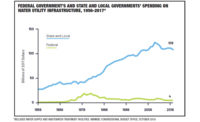Heads of several federal agencies said they have mounted a massive, multi-pronged effort to bring relief to people in the New Orleans area and other Gulf Coast locations battered by Hurricane Katrina. To help boost supplies of motor fuels, Environmental Protection Agency Administrator Stephen Johnson said on Aug. 31 he had notified governors of all states that he has temporarily waived certain Clean Air Act standards that apply to gasoline and diesel.
 |
| Chertoff: Agencies launched one of largest disaster response efforts in U.S. history (Photo: Dept. of Homeland Security) |
Dept. of Homeland Security Secretary Michael Chertoff said federal agencies had launched one of the largest emergency response effort in U.S. history. Speaking at a press conference at DHS headquarters, he said the department had declared the hurricane aftermath the first "incident of national significance" under a National Response Plan set up earlier this year. He said the plan aims to bring together federal resources to make relief efforts more effective.
The message from President Bush to agencies is "all hands on deck," said Assistant Defense Secretary Paul McHale. He said the Defense Dept. actions included sending a fleet of 50 helicopters eight "swift boat" teams to the area and a 500-bed hospital ship that was slated to arrive near New Orleans on Sept. 8.
Referring to the situation as "terrible tragedy," Chertoff said the situation in affected areas "remains very dangerous," and urged residents to stay in shelters and away from areas hit by the storm.
The newly issued Clean Air waiver of fuel "volatility" standards, which refers to the evaporation rate and of diesel fuel's sulfur level, will extend through Sept. 15. Energy Secretary Samuel Bodman said, In my view this is really a big deal. This is something that should materially change the supply of gasoline fuel."
 |
| EPA's Johnson temporarily waived fuel standard, to boost supplies(Photo: Environmental Protection Agency) |
Bodman said the move would enable refiners to use "winter fuels" they now have in their inventories, whose composition would otherwise make them unusable in certain parts of the country at this time of the year.
Bodman also said he had granted request from one company to make a withdrawal from the Strategic Petroleum Reserve and said the Dept. of Energy was reviewing other such requests.
Among other aspects of the relief campaign, Health and Human Services Secretary Michael Leavitt said the first of 40 medical shelters had been set up and had begun to treat patients. Ten more would be opened within 72 hours. When all 40 are operating, he said, they will have capacity of 10,000 beds and be staffed by 4,000 medical personnel. To treat those requiring more in-depth care, Leavitt said HHS had identified hospital facilities totaling some 2,600 beds in a 12-state region and 40,000 beds around the country.
Transportation Secretary Norman Mineta said 13.4 million liters of water, 10,000 tarps, 3.4 million lbs. of ice and 144 generators had been shipped to the Gulf region. He said officials "are working to restore at least minimal transportation infrastructure in the region. That includes highways, airports, seaports and oil pipelines." Teams of DOT staffers have been deployed to the area, working with state officials to check bridges, clear roads, set up communications and expand operations at airports, and provide generators get fuel flowing through pipelines.


Post a comment to this article
Report Abusive Comment